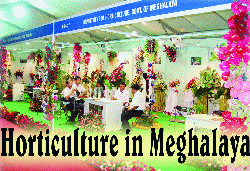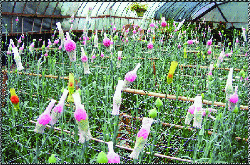Archives
Horticulture in Meghalaya
Horticulture in Meghalaya
It was Thomas Kuhn who first defined the term “paradigm shift” as the phenomenon where “one conceptual world view is  replaced by another.” In other words, it describes a change from one way of thinking to another-a transformation that doesn’t “just happen” but is driven by agents of change. Today, Horticulture in Meghalaya is on the path of a major transformation that could very well mean that this paradigm shift is well underway.
replaced by another.” In other words, it describes a change from one way of thinking to another-a transformation that doesn’t “just happen” but is driven by agents of change. Today, Horticulture in Meghalaya is on the path of a major transformation that could very well mean that this paradigm shift is well underway.
The State Government has a vision of transforming Meghalaya into a Fruit and Flower State of the country. To this end, several new initiatives have been taken to propel this vision forward. The move for creating “Horti Hubs” in each district of the State, which will function on a hub and spoke model within an area of 10-15 Kms radius will create horticulture clusters having the potential of taking off horticulture in the State on a bigger scale. The ingredients that are necessary to overcome the infrastructural bottlenecks are being provided through the Technology Mission Scheme for Horticulture Development from the Government of India.
The geo-climatic situation of Meghalaya offers an excellent scope for growing of different types of horticultural crops including fruits, vegetables, spices, plantation crops, medicinal and aromatic plants of high economic value. A wide range of tropical, sub- tropical and temperate fruits such as Mandarin, Orange, Pineapple, Banana, Lemon, Guava, Pear, Plum etc. are grown all over the State. A large variety of vegetables, both indigenous and exotic are grown across a wide range of agro climatic zones. The higher altitudes provide conducive ecosystem to grow traditional vegetables like potato and cole crops during the rainy season. Tuber and root crops such as sweet potato and tapioca, spices such as turmeric, ginger, chillies, etc. also grow abundantly. Plantation crops such as tea, cashewnut, coconut, arecanut and other spice crop like black pepper have been performing well and offer good scope for area expansion. In the long run, these crops can change the entire economic situation of the people of the State.
Growing of horticulture crops has distinct advantages over the traditional food crops. Most of the horticulture crops are perennial in nature and offer larger bio-mass production. Horticulture crops and their products have high potentiality for export and foreign exchange earning and enable productive and economic utilization of cultivable wasteland. Besides, they generate rural employment opportunities, provide viable alternative to shifting cultivation as well as check soil erosion and improve ecological balance.
The total cropped area in Meghalaya during 2004-05 was 2, 65,874 hectares which is 11.85% of the total geographical area of 22.42 lakh Ha. The net cropped is 2, 19,224 Hectares, which is about 10% of the total geographical area. The total area under fruit crops is 26.23 thousand hectares. Among the fruit crops, the maximum area is under pineapple (9.5 thousand ha) followed by citrus (8.2 thousand ha) and banana (6.2 thousand ha). The total area under vegetable crops is 11.94 thousand hectares. As far as spices are concerned, Meghalaya is one of the leading States when it comes to ginger production (9.2 thousand ha) and also one of the leading producers of quality turmeric of a variety known as Lakadong, which has about 7% curcumin content. Arecanut and cashewnut are leading plantation crops followed by tea. The total area under plantation crops is 17.99 thousand hectares.
The State’s foray into high value low volume crops, of which strawberry is the prominent and successful introduction, has changed the economic landscape of the strawberry growers of Ri-Bhoi district. Other crops like rose, lileums, anthuriums, carnations, birds of paradise are also performing very well. During the last one year, high value vegetables like brocoli and colored capsicum have been introduced and marketed successfully.
The Department of Horticulture has demonstrated the vast potentialities which exist on the horticulture sector and is breaking  new frontiers in horticulture development. The Centre of Excellence for rose and strawberry at Dewlieh, Ri-Bhoi and for Anthurium located at Samgong Horticulture Farm in East Garo Hills have played a pivotal role in this respect. Besides this, the move of the State Government to set up a Horticulture Institute in Williamnagar in East Garo Hills and a Central Agriculture University in Umsning in Ri-Bhoi district will provide the State with the required manpower and expertise required in the near future.
new frontiers in horticulture development. The Centre of Excellence for rose and strawberry at Dewlieh, Ri-Bhoi and for Anthurium located at Samgong Horticulture Farm in East Garo Hills have played a pivotal role in this respect. Besides this, the move of the State Government to set up a Horticulture Institute in Williamnagar in East Garo Hills and a Central Agriculture University in Umsning in Ri-Bhoi district will provide the State with the required manpower and expertise required in the near future.
The State is organic by tradition and this is one area which can provide maximum value to horticultural crops. Initially, the organic products can cater to the existing demand in the metro cities, gradually building scale to tap the export markets in the immediate future. The directorate of Horticulture is initiating organic certification for selective crops like tea, pineapple, cashewnut, ginger, turmeric and vegetables by delineating specific organic zones. An organic certification agency is also mooted by the State Government to provide impetus and direction. Organic manures like vermicompost and bio-fertilizers like Rhizobium and Azolla are also being promoted in farmer’s field.
Use of Green house technology, poly-houses, drip and micro irrigation system, water harvesting structures, fertigation, soilless culture are being popularised in order to minimise risk and help farmers overcome the vagaries of nature as well as to standardise quality of produce and reduce economic losses.
Post harvest management, value addition, processing and marketing are the other priority areas to which the department is giving renewed thrust during the current 11th Five Year Plan period. Setting up of Cold Chains, Refer Vans are in the pipeline and these will complement the expected surge in production volumes of high value crops in the medium term.
These new initiatives will not suffice if farmers, entrepreneurs and the private sector do not actively participate in this vision. The existing gap between the departmental officials and the farmers needs to be bridged, while closer interaction and partnership is the order of the day. The department is also looking at equipping the farmers and entrepreneurs with the best technology and marketing skills through the expertise of the Horticulture Training Centre, Pune, which is a premier training agency in the field of high tech horticulture.
A paradigm shift in approach, priority and focus is a necessity for the horticulture sector to reach the take off stage. Therefore, it is necessary to consolidate and strengthen our traditional horticulture crops like potato, ginger, turmeric, cashew nut, pineapple, orange, cabbage, cauliflower etc and scale up production and productivity. At the same time, new and emerging opportunities offered by high value horticulture crops should be tapped for the national market as well as the export market like Bangladesh through a “farm to fork” approach.

